Existing User Log In
New User Registration
Register for a free account to gain full access to the VGChartz Network and join our thriving community.



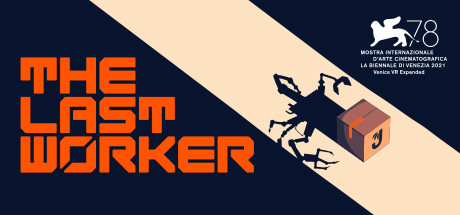

America - Front
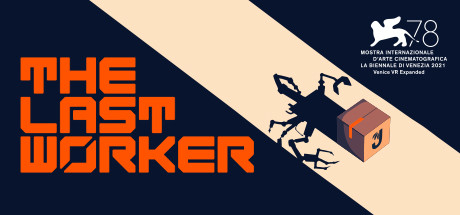

America - Back

Oiffy, Wolf & Wood Interactive Limited
Adventure
 (Add Date)
(Add Date) (Add Date)
(Add Date) (Add Date)
(Add Date)
| Owners: | 0 |
| Favorite: | 0 |
| Tracked: | 0 |
| Wishlist: | 0 |
| Now Playing: | 0 |
When considering recent developments in AI and companies like McDonald's rolling out a fully-automated venue, humanity is in an interesting place with regards to labor. Waves like this have occurred before – the hollowing out of The Rust Belt for example, but not to the same all-encompassing effect today. We've seen this song and dance explored before across other games, but not with this design template, nor the uncomfortable closeness to this impending future; ironically, those previously mentioned events occurred during Wolf & Wood and Oiffy's development timeline. Though the propinquity to a new technological revolution lends The Last Worker some genuine intrigue, it consistently fumbles with the delivery.
In a not-so-distant-future dystopia, the Amazon copycat Jüngle (pronounced young-ul), has effectively become the world’s superstore. Even the corporate figurehead, Josef Jüngle, is essentially a queer-coded Jeff Bezos from Scandinavia. Today's current situation of eccentric billionaires at the top and workers at the bottom is exasperated tenfold here. Enter your character, Kurt, the last fulfillment worker who… occasionally needs to use the bathroom. As shown in an animated opening, Kurt's decades-long epoch at this company witnessed the automated transition firsthand and he's somehow eluded the pink slip ever since. Jüngle is the only world he’s known for half of his life – to the point of residing in one of its mechanized recycling bins.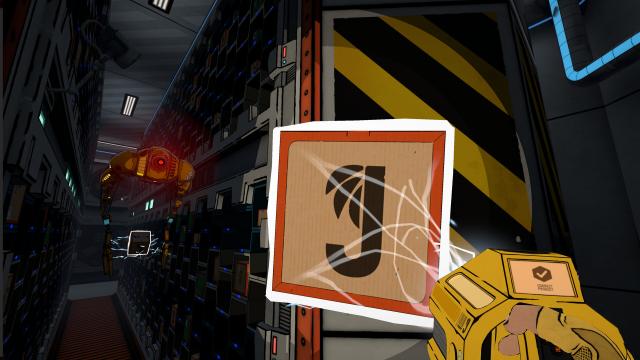
While billed as a narrative adventure, it's really more of a work game a la Papers, Please. Similar to the immigration inspector's approval process, Kurt zips around to ship or recycle a designated package. As you navigate the gray labyrinth of stories-high shelves for your box, your JüngleGun (basically the Gravity Gun) magnetically grasps it for assessment. To give it the thumbs up/down, the package has to be evaluated on whether the size and weight are correct and there's no damage. After success or failure has been determined by your invisible boss, the process repeats until six real-time minutes are up.
Wolf & Wood's main goal is about being engaging over our traditional understanding of fun. There's that part of your brain yearning to quickly race and process these packages, visually reinforced by an evolving work ranking on Kurt's JünglePod and the real-time feedback of his mysterious supervisor; it's like a dopamine micro-dose after deftly shipping those baby VR goggles or whatever other silly consumer goodie someone wants in record time, all in the hopes of ascending to the highest honor: an illustrious J ranking. Although these on-paper fundamentals are sound, scootering around and hoovering items could've been more polished: aiming and grappling packages can feel sticky, for example.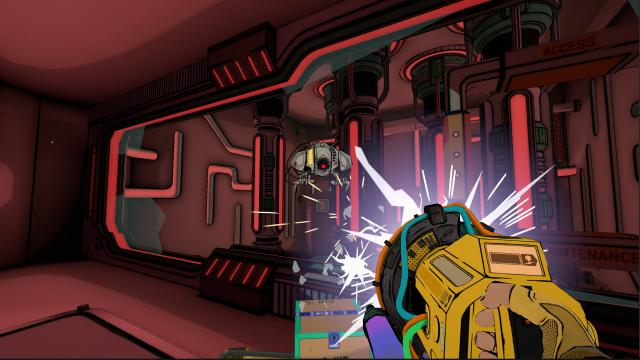
Though the Papers, Please mechanical comparison earns praise, don't expect a deep thematic marrying of mechanics with meaning; in fact, it wouldn't surprise me if others see this gamified core as outright demeaning in its point. Where's the satirical, incisive critique of Amazon if the warehouse gameplay feels rewarding? But I think that misses crucial context about Kurt's purpose. The reason he has to be aggressively goaded into disinterring Jüngle's darker secrets is because of the inherently therapeutic nature of box-fetching, the overriding sense of purpose. "At Jüngle, we deliver dreams" is one of the first lines heard after Kurt's intense out-of-body experience of seeing himself boxed in by the doldrums of his job. There's an intrinsic comfort, however false it is from our perspective, in doing the routine for over 9,000 days.
Perhaps my applause is partially due to how lackluster Worker's ancillary gameplay elements are by comparison. When not satiating the corporate overlord, mechanical diversions vary between basic stealth, combat, hacking, and the odd mini-game. One such mini-game is essentially Flappy Bird mixed with an endless runner; rather than tapping a screen to hop through a narrow window on a 2D plane, the goal is to consistently tap/hold the action button to guide a bomb plummeting through an extensive vent shaft. Since the kinesthetic sense of maneuvering always felt off, playing each segment felt like a slog. To make matters worse, it feels like these extras distracted too much from the main course, never enabling it to expand on its potential. Box-fetching receives a couple of upgrades over the campaign's runtime, including a hacking attachment to create shortcuts, but not enough before the next throwaway concept butts in.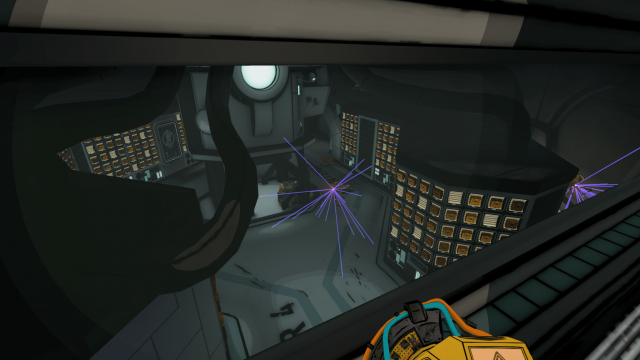
That scattershot approach to gameplay also extends to its themes and narrative structure. Again, Kurt's day-to-day and the processing mechanics do say something interesting about this work. The broad strokes will be familiar to anyone – increasing automation, corporate hegemony, unhinged consumerism, and so on – yet too little of it feels emotionally significant. The maximalist approach to its absurdity is humorous from time to time, but heavier beats accomplish virtually nothing. It’s tough to feel anything for a side character's passing or live cows being grinded into meat cubes when there’s been so little build-up or proper context. Like Kurt, the story is a slouch, taking the most comfortable routes to deliver a pre-packaged idea.
The multiple endings are an exemplar of how it cops out. Although I'll try avoid direct SPOILERS as much as possible, let's just say there's a build-up in sticking it to The Man. Beyond the satisfying climax on its own, it's also one of the rare one-off mechanics that’s satisfying – if rather easy. So, now story and gameplay are firing on several cylinders, the momentum is building up towards a confrontation, and then… it crams in this bothsidesism with another faction that was previously underdeveloped. I'll admit: I was starting to forgive Writer/Director Jörg Tittel's shortcomings when the climactic showdown was underway, but then this example of creative cowardice undercut that goodwill.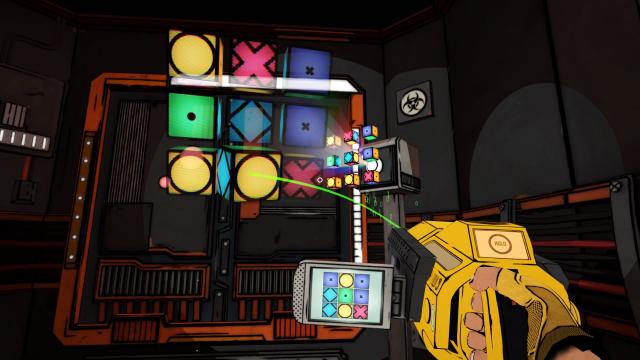
"Scattershot" is becoming a go-to descriptor here because it also fits in well with Worker’s presentation too. Not against the art design, mind you. Mick McMahon's (Judge Dredd, 2000 AD) comic book aesthetic perfectly marries with the austere super-structures and robots, making it the game's greatest strength. Conversely, neither voice acting nor Oliver Kraus' soundtrack often captivate. Which is surprising too, given talents like Zelda Williams and the venerable Jason Isaacs are among its limited roster. I'm sure Isaacs likes trying new things, but annoying-as-hell AI drone (named SKEW) just wasn’t the right fit; or, perhaps the tawdry dialogue or direction simply never clicked. Either way, it doesn’t rank high amongst other narrative-focused titles of its stature.
Outside of the multiple endings ironically diminishing its satirical bite, there's not much to do beyond the 3.5-hour campaign. Where that falls in the acceptability price range for $20 varies from person to person, but I was hoping there'd be more than a product display section to some of this future's kooky consumer products. Not having something akin to Papers, Please's Endless Mode is a huge missed opportunity. Not only would that emphasize Worker's best gameplay without replaying the same static missions, it'd also add a fun meta layer: people retreating from the real world to "play" in a systemized space about retrieving vacuous consumer goods for a better spot amongst online leaderboards. The jokes are writing themselves at this point!
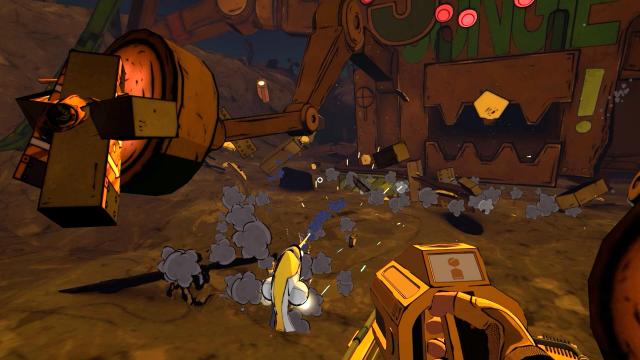
Missed opportunity is – sadly – endemic to The Last Worker as a whole. The ground to cover in satirizing Not Amazon™ is ripe and plentiful, but most critiques feel surface-level or thematically confused. The core box-fetching gameplay is subtly satisfying, but gets crowded out by ancillary mechanics that should’ve been returned and refunded. It wants to capture an audience with humor, good production values, and a novel approach to exploring these topics, but ultimately doesn't feel properly-packaged.
Contractor by trade and writer by hobby, Lee's obnoxious criticisms have found a way to be featured across several gaming sites: N4G, VGChartz, Gaming Nexus, DarkStation, and TechRaptor! He started gaming in the mid-90s and has had the privilege in playing many games across a plethora of platforms. Reader warning: each click given to his articles only helps to inflate his Texas-sized ego. Proceed with caution.









